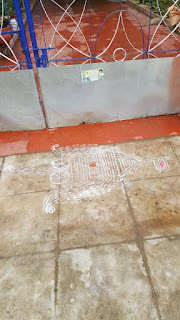RATHA SAPTHAMI, BHEESHMA ASHTAMI - 468
.
RATHA SAPTHAMI & BHEESHMA ASHTAMI
This is the celebration to mark the beginning of spring. This comes on the seventh day after amavasa of thai. Sun on this day moves from the southeast to the northeast. People worship sun on this day. He who takes bath early in the morning with arka leaf is purified by mother Ganges.
Seven Arka leaves (errukkam leaf) are important on this day. Ladies keep seven leafs with turmeric and raw rice on their head and take bath. One on their head, two on shoulders, two on knees and two on feet. Fasting is important on this day. It is very auspicious day to offer tarpana to our ancestors. Women put rangoli with seven horses and chariot representing sun god. chakkrai pongal is prepared, (akkaravadasal) is prepared and offered to god for good health and prosperity.
Ratha Sapthami is being celebrated to worship the Sun God. Ratha Sapthami falls on the seventh day following the Sun’s northerly movement which is called as “Uttarayana”. It is symbolically represented in the form of Sun God, Surya turning his Ratha (Chariot) drawn by seven horses towards the northern hemisphere. The Chariot has 12 wheels, which represents the 12 signs of the Zodiac.
The Ratha Saptami festival seeks the benevolent cosmic spread of energy and light from the Sun God. During Ratha Sapthami people starts the day with a purification bath by holding Ekka (Calotropis Gigantea) leaves on their body. Ekka leaves are also known as “Arka Patra” in Sanskrit, “Erukka Elai” in Tamil. The workd Arka is also a synonym for Surya or Sun. The shape of the Ekka leaves is said to represent the shoulders and chariot of Sun God. Seven Ekka leaves are placed on the seven chakras of the body. The “Nadis” are the channels through which the energies of the subtle body are said to flow. They connect at special point of intensity called “Chakras”. It is believed the “Ekka Leaves” has the power to remove any toxicants in the ‘Nadis’ and provides necessary energy to body to absorb the light rays from the Sun God.
BHEESHMA ASHTAMI
This festival is associated with 'Bhishma Pitamaha', the grandsire of the epic Mahabharata'. Bhishma is known as the legendary king of Mahabharata whom Lord Krishna praised as the Lords of the lord. Bhishmashtami i.e Bhishma Ashtami,is the festival which is celebrated on the twenty-third day of Magha (Jan-Feb) and eighth lunar day of the light half (waxing phase of the moon)and it has special and traditional origin.
During the war of Kurukshetra, Bhishma had to enter the war on the side of Kauravas. As there were defeat after defeat, prince Duryodhana of Kauravas, suspected the behaviour of Bhishma Pitamaha. Bhishma was disturbed by this and to save his self respect, in anguish, he took up the most powerful 'Astra', which could only be opposed by anyone including Shri Krishna. However, Krishna had already declared beforehand that he would not touch a weapon during the war.
But since Bhisham's attack could not be counteracted, Krishhna had to break his promise and was compelled to use the Sudarshan Chakra. On Seeing Shri Krishna's decision, Bhishma stopped fighting and laid himself to death on the bed of arrows (Sharashiayya). Father Shantanu had given a boon to Bhishma, that he will die only when he wishes so.
Accordingly after the 18-day war in Mahabharata, Bhisma opted for the Ashtami day on the Shukla Paksha of Magh month to leave his body and merge with the Supreme God. This was the auspicious Uttarayan period, the daytime of Devas. Hence this day is celebrated as Bhishmashtami in the honour of Bhishma Pitamaha.
It is the next day to Ratha Saptami. It is believed that Bhishma's soul departed on this day after the war of Kurukshetra came to an end. According to the Tithi Tattwa, Bhishmashtami day is dedicated to Bhishma, the son of Ganga, and great uncle of the Pandava and Kaurava. Bhishma died childless without any direct descendant.
On this day devotees take bath early in the morning, perform the pooja and observe the fast from sunrise to sunset. Being the 'Pitamaha' of all, in honour and to pacify his soul, all the devotees come together and make religious offerings of Ganga-water, to his spirit.
The sesame seeds and boiled rice is offered to him. These rituals compensate the sins of the whole year. This offering is given to the childless hero Bhishma of the race of Vyaghrapada. Then people pray saying, "May Bhishma, the son of Santanu, the speaker of truth and defeater of his passions, obtain by this water the oblations due by sons and grandsons .





Comments
Post a Comment